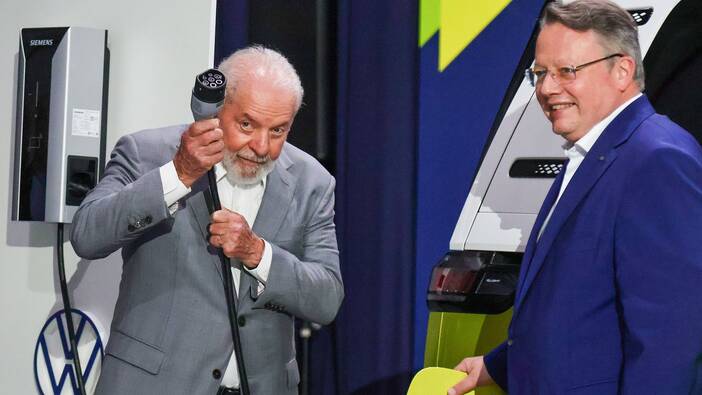
Effie Achtsioglou und Euclid Tsakalotos bei einer Debatte griechischen Parlament über den Staatshaushalt für das Haushaltsjahr 2024 , Athen, 13.12.2023., IMAGO / ANE Edition
A recent debate in the European Parliament was not particularly flattering for the government of Greek Prime Minister Kyriakos Mitsotakis. At the plenary session on 7 February, a resolution expressing “grave concerns about the very serious threats to democracy, the rule of law and fundamental rights” in Greece passed, with 330 MEPs voting in favour, 254 against, and 26 abstentions. Above all, the resolution raises the concern that “freedom of the media” is under threat. The use of intelligence services to spy on opposition leaders was also strongly condemned, as was the use of “excessive police force” and “attacks and smear campaigns” against human rights groups and migrants.
Boris Kanzleiter directs the Rosa Luxemburg Foundation’s Athens Office.
Mitsotakis, who represents the conservative Nea Dimokratia (New Democracy) party, has been in power since 2019 and was unimpressed by the resolution, which was adopted with the votes of the left-wing, green, and social democratic parties against conservatives and right-wing extremists, largely because major media outlets in Greece hardly reported on it.
Mitsotakis: Authoritarian Neoliberal
Kyriakos Mitsotakis, an intelligent 55-year-old Harvard graduate and scion of a powerful family dynasty (his father Konstantinos was Prime Minister from 1990 to 1993) is quick to foreground his successes instead. Most prominent among these is the fact that after many years of crisis, those in economic circles now consider Greece to be a prodigy. At the end of 2023, the British financial magazine The Economist ranked the Mediterranean country first in its list of “most successful economies” for the second year in a row. The decisive factors in this regard are the country’s booming stock prices and the increase in its credit rating, on top of economic growth and a drop in unemployment levels. The fact that the majority of these new jobs are precarious and that wages are stagnant plays no role in this politically motivated success story.
Mitsotakis’s blend of authoritarian control and neoliberal economic policy — a social model which can be called “authoritarian neoliberalism” — has helped him secure some degree of acclaim in the almost four years since Alexis Tsipras’s left-wing government was voted out of office.
Mitsotakis has no reason to fear international pressure concerning the human rights situation in Greece.
High-profile critics such as Dimitris Christopoulos, the Dean of the Department of Political Science at Panteion University, have described the change underway as an “Orbánization” of Greece. However, unlike Viktor Orbán, Mitsotakis relies on close cooperation with the USA, NATO, and the European Commission, all of whom are highly engaged in Mitsotakis’s efforts to improve relations with NATO partner Turkey. After all, these groups also have a vested interest in maintaining military control of the eastern Mediterranean, a region whose importance for security policy has surged in the context of the wars in Ukraine and the Middle East.
In light of this, Mitsotakis has no reason to fear international pressure concerning the human rights situation in Greece. In fact, the nationalist rhetoric spouted by the three far-right parties in the Greek parliament ensures that Mitsotakis can present himself as a moderate conservative. His New Democracy party is currently unchallenged for the European elections next June, leading the polls with just under 30 percent.
Syriza in Crisis
The Greek Left, on the other hand, finds itself in a profound crisis. Just ten years ago, large swathes of society mobilized against the effects of austerity policies imposed by the European Commission, the European Central Bank, and the International Monetary Fund, which imposed a series of harsh austerity measures on Greece in the context of the European debt crisis. People in Greece hated the “troika”, which was perceived as a neo-colonial entity, and this discontent fueled waves of mass protests and general strikes which strengthened the left. During this period, Greece was a laboratory for rebellious politics, in which social movements, the mass occupations of squares, critical academia, and left-wing parties interacted.
In this context, the Coalition of the Radical Left (Syriza) — a political alliance that united a broad spectrum of left-wing groups — celebrated unforeseen successes. Syriza had gained 3.2 percent in the 2004 election, and under the charismatic leadership of Alexis Tsipras it won a majority of the parliamentary seats in early 2015 with 36.3 percent of the vote, giving the entire European Left cause for celebration.
However, shortly after coming to power the party was faced with a major crisis. The troika forced Tsipras’s hand, and a pragmatic approach to crisis management was adopted in the summer of 2015. His government bowed to the dictates and agreed to privatizations and budget cuts. Doing so allowed Syriza to mitigate the most severe consequences of the austerity measures and implement some key reforms, particularly in the healthcare sector. Nevertheless, one of Tsipras’ major achievements in foreign policy was reaching an agreement which settled the name dispute with North Macedonia.
Syriza’s party congress was upended by a surprise statement by long-time leader Alexis Tsipras, urging Kasselakis to put his leadership up to a second, party-wide vote.
However, the left-wing government’s popularity waned, as did its capacity to mobilize its constituency. In the parliamentary elections of July 2019, Syriza still won an impressive 31.5 percent of the vote. But the old order had returned: Mitsotakis took the lead over Tsipras with 39.8 percent of the vote and replaced him as prime minister. Syriza did not manage to recover. On the contrary, in last year’s parliamentary elections in June, the party received a mere 17.8 percent and Tsipras resigned as party leader.
In the lead-up to the upcoming European Parliamentary elections, the Greek Left appears to be highly fragmented. Last September, Syriza members elected 35-year-old Stefanos Kasselakis as their leader. He is a dazzling public figure who has garnered a great deal of interest. At the same time, his personality and his political actions have provoked irritation and conflict within the party.
At the time of the party’s internal primaries, Kasselakis still seemed like a compelling leader because of his youthfulness. While his openly gay partnership is unusual for a leading politician in conservative Greece, since his election, Kasselakis has been trying to push Syriza closer to the center in terms of politics. Critics point out that the newcomer used to work for Goldman Sachs and was not an active participant in left-wing politics before he suddenly switched gears and joined Syriz. Kasselakis has said that Greece needs a “patriotic Left”, So far, he has been unable to convince the public. According to recent opinion polls, Syriza is in third place polling at only 13 percent, even trailing behind the social-democratic party PASOK-KINAL, which has almost no distinctive profile.
Syriza’s party congress, which began yesterday, was supposed to demonstrate how the seemingly disoriented party intends to position itself for the European elections. But those plans were upended by a surprise statement by long-time leader Alexis Tsipras, urging Kasselakis to put his leadership up to a second, party-wide vote. Kasselakis subsequently accepted the challenge in his opening speech, and announced a leadership contest for the coming weeks.
Four Left-Wing Lists
The trajectory Kasselakis has taken thus far has caused a significant part of Syriza’s leadership to break with him. Effie Achtsioglou, the former Minister for Labour who was defeated in the party’s internal elections, resigned from the party last November along with ten other members of parliament. Three of the five MEPs and 46 members of the Central Committee followed suit. Among them are former Minister of Finance Euclid Tsakalotos and former Minister of the Interior Alexis Charitsis, two heavyweights from Tsipras’s former cabinet. The renegade MPs founded the Nea Aristera (New Left) party, which will hold its first major congress in early March.
Charitsis, the spokesman for the Nea Aristera parliamentary group, wants to give the new party an unmistakable left-wing profile. His top priorities include “social justice, ecology, and democracy.” The party seems to be particularly popular among the academic and urban left, even if many in this milieu have failed to reflect critically on Syriza’s time in government, which was shaped by the leading Nea Aristera functionaries. However, the decisive question is how this new party can make itself known throughout the country, in a short amount of time, with the small number of resources it has at its disposal. At the moment, Nea Aristera is garnering around 3 percent in opinion polls. The party is looking for potential alliance partners so that it can win at least one or two seats in the European elections.
The regrouping has only just begun.
The social democratic PASOK-KINAL benefited from Syriza’s crisis. Indeed, both Syriza and Nea Aristera are now facing competition from within the Left. Former finance minister Yanis Varoufakis, who left the Syriza government back in 2015 and gained international notoriety for his high-profile confrontations with Wolfgang Schäuble, is expected to run in the European elections with his party MeRA25, but can currently only hope to receive around three percent of the vote. It is difficult to say how MeRA25 will fare in the elections. Although an alliance with Nea Aristera would be politically feasible, unresolved historical conflicts make it highly unlikely. A more realistic alliance is one between Nea Aristera and the green party Kosmos, founded by former Syriza MEP Petros Kokkalis.
In contrast, the long-established Communist Party of Greece (KKE) is remarkably stable. According to recent opinion polls, the party’s long-standing leader, 68-year-old Dimitris Koutsoumpas, is even considered the most popular politician in the country. The KKE is socio-politically conservative and politically dogmatic; however, it has its own trade union, PAME, which has a very high mobilization potential. Its student and youth association is also deeply embedded in society at large.
According to surveys, the KKE could win 10 percent of the vote in the European elections. While its principled refusal to participate in left-wing coalition governments and alliances obviously bolsters the party’s credibility, it also paralyzes its electoral potential for any kind of parliamentary realpolitik.
Nevertheless, the regrouping has only just begun. Kasselakis’s fate as a party leader will hinge on Syriza’s success or failure in the European elections. Any electoral success in the camp to the left of Syriza will require that new alliances be formed.
The decisive factor, however, is whether the Greek Left can offer a credible alternative to the Mitsotakis government’s model of authoritarian neoliberalism. Students who are currently on strike against the planned privatization of universities may offer the first step in the right direction: their action marks the public return of the kind of highly visible grassroots social resistance that has largely been missing in recent years.
This article first appeared in nd.aktuell in cooperation with the Rosa Luxemburg Foundation. Translated by Hunter Bolin and Eve Richens for Gegensatz Translation Collective.

